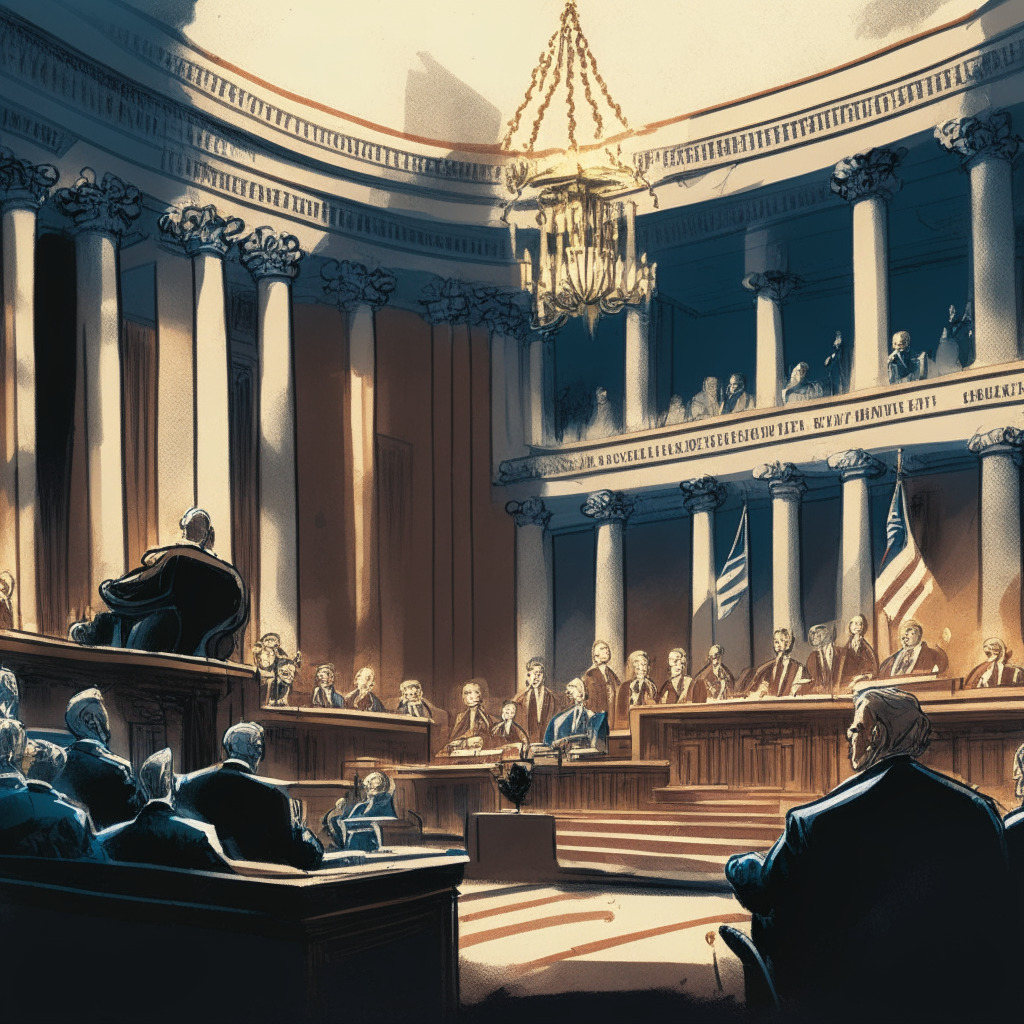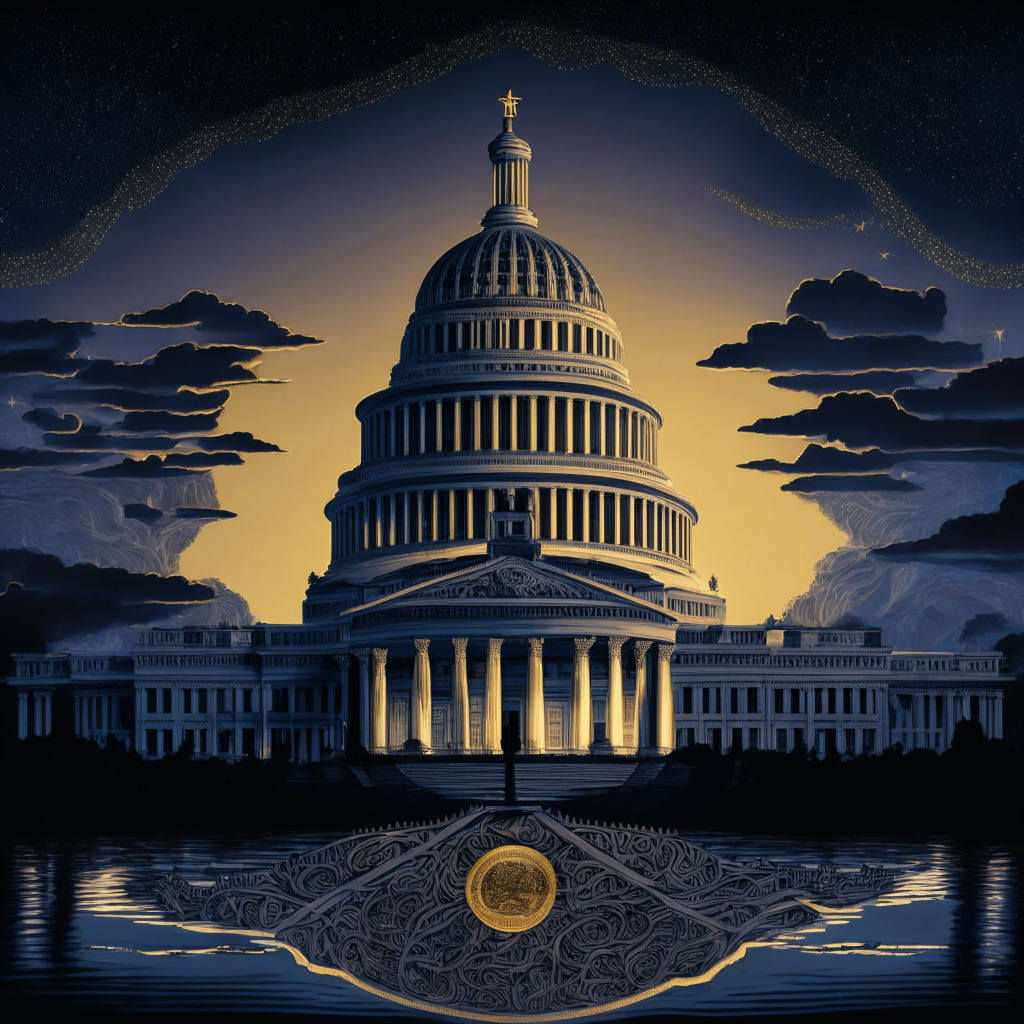The US Treasury and IRS are planning new regulations on digital asset brokers to achieve higher taxpayer compliance. Starting in 2025, they’ll require information about profits, losses, and gross proceeds from cryptocurrency transactions. However, this regulatory step could inadvertently limit the innovation offered by blockchain technology.
Search Results for: US Treasury Department
Rollercoaster Predictions: Bitcoin’s Potential Rise to $22K Amidst Market Uncertainty
“Despite the gloomy market sentiment and legal hurdles from SEC, market analysts forecast Bitcoin could hit the $22K mark. U.S. inflation drop and Federal Reserve’s liquidity drainage could push investors to alternative assets like Bitcoin. However, serious challenges still remain.”
Sanction Enforced: Binance Removes Banco de Venezuela from P2P Services
“In a move to enforce international financial sanctions, Binance, the world’s largest crypto exchange, has eliminated a payment method attached to Banco de Venezuela from its P2P trading service. This action reflects the limited room for maneuver that global crypto exchanges have amidst international sanctions and raises questions about the extent to which the promises of cryptocurrencies hold true in a regulated market.”
Unraveling the IRS Draft on Digital Asset Reporting: A Regulatory Leap or Misguided Move?
The US IRS has issued draft guidelines on reporting rules for digital asset brokers. Aimed at regulating the digital asset industry, this regulation intends to streamline tax reporting and prevent fraud, proposing to raise $28 billion in fresh tax over a decade. Critics label it as “misguided” and “an attack on the digital asset ecosystem.”
Tornado Cash Co-Founder Arrest and Debate on Developer Responsibility in Blockchain Regulation
Tornado Cash co-founder, Roman Storm, was arrested over money-laundering charges. The case has raised debates about responsibility and control within the blockchain industry, particularly for software developers. This controversy suggests that future blockchain regulation is navigating uncertain territory.
Tornado Cash Founders Charged: A Blow for Privacy or Triumph for Law Enforcement?
“Roman Storm and Roman Semenov, key figures of Tornado Cash, are facing charges for helping North Korea’s Lazarus Group launder over $1 billion via a privacy mixer. This incident sparks debate on blockchain privacy protections being exploited by criminals versus the potential shortfalls of legal jurisdiction in regulating such abuses.”
Decoding the Legal Matrix: Tornado Cash, DAOs, and the Future of Blockchain Oversight
A recent legal case saw a federal judge approving U.S. Treasury’s sanctions on Tornado Cash, a crypto tool allegedly used by North Korea for money laundering. The ruling, which validated an enforcement action against a Decentralized Autonomous Organization (DAO), sets a compelling precedent for DAOs’ future role in crypto projects.
Upholding Sanctions on Crypto Mixer Tornado Cash: A Regulatory Triumph or Freedom Infringement?
“A federal judge in Texas validated sanctions on Tornado Cash, a crypto mixing service, dismissing concerns that the Treasury Department overstepped their jurisdiction. This significant precedent for regulatory authority over crypto services underscores the need to balance user anonymity with oversight for illicit activities.”
Navigating Crypto’s Role in Political Fundraising: A New Dawn or Regulatory Nightmare?
The California Fair Political Practices Commission issued new rules for political aspirants accepting crypto donations, outlining specific procedures to ensure transparency and accountability. Crypto donations are becoming common in campaigns, though with stipulations around anonymous donors and exchange agreements. Regulations also cover advertising disclosures, contribution limits, and more.
PayPal’s Stablecoin Revolution: Evolving Crypto Landscape with Regulatory Safeguards
PayPal launches its own stablecoin, PYUSD, representing a pioneering move in bringing regulatory oversight and customer asset protection to the crypto world. The coin, developed with Paxos, is closely monitored by the New York Department of Financial Services to secure it against bankruptcy risks.
Navigating Uncharted Waters: The Question of Crypto Regulation and Tax Evasion
Senators Elizabeth Warren and Bob Casey are urging strict enforcement of crypto reporting requirements within the Infrastructure Investment and Jobs Act (IIJA), suggesting clear tax reporting guidelines for digital asset “brokers”. This measure aims to close the $50 billion “crypto tax gap”, addressing the tax evasion in the crypto industry.
Navigating Rough Waters: Binance’s New Compliance Leadership Amid Regulatory Challenges
“Binance announced that Kristen Hecht assumed the role of Deputy Chief Compliance Officer amidst potential fraud charges. Her responsibilities include strengthening compliance provisions, combating financial crime risks and overseeing anti-money laundering teams. This occurs as Binance navigates through regulatory scrutiny in the US and Europe.”
Binance Bolsters Defense with New Deputy Chief Amid Mounting Regulatory Scrutiny
Binance, the renowned cryptocurrency exchange, has appointed Kristen Hecht as its new Deputy Chief Compliance and Global Money Laundering Reporting Officer amid potential fraud charges from US regulators. Hecht will monitor key areas while managing company’s compliance program and liaising with regulators and industry bodies.
U.S. Crypto Regulation: Balancing Innovation and Compliance in the Blockchain Era
“The U.S Congress moved closer to regulatory clarity with two crypto-related bills: the Financial Innovation and Technology for the 21st Century Act, aimed at crypto company registrations, and the Blockchain Regulatory Certainty Act, aiming to cut down barriers for blockchain developers. However, potential conflicts between lawmakers and industry operators may lead to strenuous compliance requirements, possibly bringing the crypto industry closer to traditional finance rules and limitations.”
Navigating the New Terrain: Implications of the NDAA Bill on Crypto Privacy and Regulation
The U.S. Senate has passed the National Defense Authorization Act, imposing new regulations on the digital asset world, including privacy coins and crypto mixers. The regulations aim to stem crypto-related fraud and are expected to force an elevation in crypto regulatory standards, obliging authorities to crack down on anonymous crypto transactions. The discourse reflects the conflict between privacy freedoms versus governance needs in the crypto sector.
2024 NDAA and Crypto: Striking Balance between Oversight and Innovation
The United States Senate has passed the 2024 National Defense Authorization Act that targets crypto mixers, crypto trading institutions, and anonymous coins. The bill draws provisions from the Digital Asset Anti-Money Laundering Act and the Responsible Financial Innovation Act for improved oversight on crypto-based activities. Key measures include examination standards for crypto, preventing FTX-style events, and studies to curb anonymous crypto transactions.
U.S. Senate Tightens Crypto Regulations in NDAA 2024: A Necessity or Threat to Blockchain Freedom?
The U.S. Senate’s passage of the 2024 National Defense Authorization Act introduces tighter regulations for financial institutions engaged in crypto trading, marking a significant legislative shift. The bill targets crypto mixers and “anonymity-enhancing” crypto assets and aims to strengthen compliance with money laundering and sanctions laws.
Blockchain’s Role in Securing the AI-Driven Future: An Essential Counteraction to AI Threats
“AI’s potential benefits come with risks, such as new attack avenues for cybercriminals. Blockchain technology could counter these security threats introduced by AI. Its immutable, decentralized storage combats unauthorized modifications or tampering with datasets that define AI models, assuring data integrity and preventing unauthorized AI utilization.”
FedNow vs Cryptocurrencies: A Leap Towards Centralized Digital Finance or a Threat to Decentralization?
The US Federal Reserve’s new FedNow Service facilitates instant money transfers 24/7, which could be considered a challenge to cryptocurrencies known for similar features. However, cryptocurrencies’ decentralized nature, transparency, and immunity to manipulation or censorship present a stark contrast to traditional finance systems. Concerns arise as some view FedNow as a step towards Central Bank Digital Currency, potentially enabling government control over citizens’ lives.
Decoding FedNow: U.S Federal Reserve’s Stand on CBDCs and Future of Instant Payment Services
The U.S. Federal Reserve’s new instant payment service, FedNow, set to launch in July 2023, is not associated with central bank digital currencies (CBDCs), but operates within the fiat ecosystem. Despite testing by numerous institutions and growing CBDC interest globally, the Federal Reserve reiterates, it requires legislative authorization before issuing a CBDC.
Debating the CANSEE Act: Crypto’s Regulatory Future or Innovation Stifler?
The Crypto-Asset National Security Enhancement and Enforcement (CANSEE) Act, aims to enforce stricter KYC/AML regulations on decentralized finance (DeFi) operations. Critics worry that the bill, requiring financial responsibility from project investors, can deter potential backers. The act also plans to increase anti-money-laundering capabilities of the U.S. Treasury Department extending to nontraditional financial structures like cryptocurrency.
Navigating the Regulatory Tightrope: New Senate Bill Targets DeFi Sector for Enhanced AML Measures
The proposed Crypto-Asset National Security Enhancement Act of 2023 seeks to implement stringent anti-money laundering measures on decentralized finance (DeFi) protocols. The bill presents solutions to regulate these protocols, aiming to enhance security, prevent evasion and sanction violations. It also addresses potential challenges tied to the regulation’s possibly discouraging impact on industry innovation.
Bitcoin Plunges to $30,600: Unexpected U.S. Employment Data Shakes Financial Markets
The value of Bitcoin plunged to $30,600 following surprising US employment data indicating 497,000 private-sector jobs added in June. This resulted in significant financial market fluctuations, with speculation of further Federal Reserve rate hikes affecting crypto and stock markets negatively.
Making Waves: Binance’s Battle to Change Crypto Compliance Perception
Binance, the world’s largest cryptocurrency exchange, is striving to break the perception of the crypto industry’s non-compliance. With a comprehensive compliance team including former law enforcement officers, regulators and crypto and banking experts, they actively combat potential financial crimes, monitor international regulatory developments and maintain customer due diligence. Despite facing legal challenges, Binance continues its rigorous compliance efforts.
Digital Asset Market Structure: A Path for Crypto Regulation or Hindrance to SEC’s Authority?
House Financial Services Committee Chair Maxine Waters proposed the Digital Asset Market Structure bill, offering US-based digital asset exchanges a pathway for SEC registration, seeking regulatory clarity for the crypto industry. The legislation aims to approve digital securities, commodities, and stablecoins for trading while providing guidelines to distinguish between crypto-based securities and commodities.
Collapse of Crypto-Friendly Banks: Time to Rethink Deposit Insurance Limits?
Circle and Sequoia Capital were among top depositors in collapsed Silicon Valley Bank (SVB), raising concerns about depositor fund security and current regulations in the crypto space. The situation highlights the potential need for increased deposit insurance limits as more financial institutions embrace cryptocurrencies and blockchain technology.
Atomic Wallet Hack: How Hacker Groups Evade Detection Through Chain-Hopping and Mixers
Hackers exploited Atomic Wallet for over $100 million, using THORChain to conceal their tracks by converting stolen ETH to BTC. Connected to the North Korean group Lazarus, these hackers have a history of attacking crypto exchanges and using chain-hopping techniques to launder funds.
Darknet Task Force: Balancing Crypto Crime Fight and Blockchain Innovation
The Department of Homeland Security has formed the “Darknet Marketplace and Digital Currency Crimes Task Force,” an interagency group aimed at investigating crypto and darknet crimes and increasing collaboration. The Task Force will play a crucial role in mitigating criminal activity impact while balancing regulation and innovation in the evolving crypto industry.
Crypto Market Recovering Amid Regulatory Tensions: Binance vs SEC and CBDC Evaluations
The crypto market shows signs of recovery as the U.S. inflation rate cools and the Fed abstains from raising interest rates. Leading cryptocurrencies report nominal gains, while Binance faces legal battles with the SEC. Key events this week include discussions on central bank digital currencies and support for a draft bill to regulate cryptocurrencies, indicating that regulatory debates play a crucial role in shaping the future of the crypto market.
Unraveling the Massive XRP Account Deletion: Impact on XRPL and Crypto Investors
The XRP Ledger experienced a significant spike in account deletions, primarily attributed to Poloniex deleting around 15,000 old XRP accounts, recovering 275,000 XRP tokens, and prompting a substantial token burn in fees. The account deletion and token burning could optimize exchange operations and maintain compliance, but may also impact XRPL users and XRP’s market value.
Bankrupt Bittrex Allows Asset Withdrawals: Balancing Consumer Interests vs. Crypto Regulation
US Bankruptcy Judge Brendan L. Shannon recently granted Bittrex customers the opportunity to withdraw assets from the bankrupt exchange platform despite the DOJ’s objection. The court order highlights the complex balance between consumer protection and regulation in the cryptocurrency industry.
Atomic Wallet Breach: $100M Loss Linked to North Korea, Security Protocols under Scrutiny
Elliptic discovered that over $100 million was lost by Atomic Wallet users, with more than 5,500 wallets compromised. The Lazarus Group, allegedly linked to North Korea, is believed to be behind the breach. Dr. Sarah Brown emphasizes the need for advanced security protocols and user vigilance in the crypto market.































